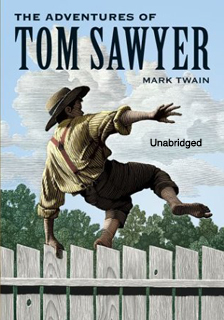My top 10 favorite passages from The Adventures of Tom Sawyer by Mark Twain
 It took me a while, but I finally got around to reading Mark Twain, starting with The Adventures of Tom Sawyer, which I finished this week.
It took me a while, but I finally got around to reading Mark Twain, starting with The Adventures of Tom Sawyer, which I finished this week.
I figured the author was good, given all the praise that’s continuously heaped on him. But I didn’t know he’d be this good. I had no idea he was as laugh-out-loud funny as Jerry Seinfeld (even more so, maybe).
More than that, Twain has the uncanny ability to turn even the most mundane occurrences into entertaining literature (i.e. a poodle playing with a beetle). He is a master of the English language and a joy to read. As a bonus, he’s a modern day Confucius, sharing wisdom and life hacks throughout this 184 page book.
Here are 10 of my favorite passages:
- After Tom dupes his contemporaries into whitewashing a fence for him: “Tom said to himself that it was not such a hollow world, after all. He had discovered a great law of human action, without knowing it – namely, that in order to make a man or a boy covet a thing, it is only necessary to make the thing difficult to attain. If he had been a great and wise philosopher, like the writer of this book, he would now have comprehended that Work consists of whatever a body is obliged to do, and that Play consists of whatever a body is not obliged to do.”
- “Let us draw the curtain of charity over the rest of the scene.” Best kicker in the history of storytelling. Quoted after Tom tricks his church authorities into thinking he has studied the New Testament in order to get a free Bible. When asked to name two of the twelve apostles in front of the entire congregation as proof of his education, Tom replies, “David and Goliath!” Hilarity ensues.
- “Devil follow corpse, cat follow devil, warts follow cat, I’m done with ye!” Tom’s ridiculous remedy chant for ridding warts.
- “She put the jacket away, and stood by musing a minute. Twice she put out her hand to take the garment again, and twice she refrained. Once more she ventured, and this time she fortified herself with the thought: ‘It’s a good lie — it’s a good lie — I won’t let it grieve me.’ So she sought the jacket pocket. A moment later she was reading Tom’s piece of bark through flowing tears and saying: ‘I could forgive the boy, now, if he’d committed a million sins!'” Aunt Polly, after catching Tom in what she thought was his latest lie, which actually turned out to be the truth.
- “There comes a time in every rightly-constructed boy’s life when he has a raging desire to go somewhere and dig for hidden treasure.” Best chapter lead ever.
- “If the words had been lightning they could not have leaped with a more stunning suddenness from Huck’s blanched lips.” Powerful metaphor.
- Tom and Becky watching their last candle fade while lost in a cave: “The children fastened their eyes upon their bit of candle and watched it melt slowly and pitilessly away; saw the half inch of wick stand alone at last; saw the feeble flame rise and fall, climb the thin column of smoke, linger at its top a moment, and then — the horror of utter darkness reigned!” I told you so. Twain can infuse a smoldering candle with intense suspense.
- “A stalagmite had been slowly growing up from the ground for ages, built by the water-drip from a stalactite overhead. The captive had broken off the stalagmite, and upon the stump had placed a stone, wherein he had scooped a shallow hollow to catch the precious drop that fell once in every three minutes with the dreary regularity of a clock-tick — a dessert spoonful once in four and twenty hours. That drop was falling when the Pyramids were new; when Troy fell; when the foundations of Rome were laid when Christ was crucified; when the Conqueror created the British empire; when Columbus sailed; when the massacre at Lexington was ‘news.’ It is falling now; it will still be falling when all these things shall have sunk down the afternoon of history, and the twilight of tradition, and been swallowed up in the thick night of oblivion. Has everything a purpose and a mission? Did this drop fall patiently during five thousand years to be ready for this flitting human insect’s need? And has it another important object to accomplish ten thousand years to come?” That, my friends, may be the most brilliant and elegant description of time in all of literature.
- “Huck don’t need it. Huck’s rich.” Zing!
- Huck defending his independence: “Everything’s so awful reg’lar a body can’t stand it.” “Well, everybody does that way, Huck.” “Tom, it don’t make no difference. I ain’t everybody, and I can’t stand it. It’s awful to be tied up so.” Makes you want to live your own life and not somebody else’s, no?
- BONUS: “So endeth this chronicle. It being strictly a history of a boy, it must stop here; the story could not go much further without becoming the history of a man.”
All told, I’m the latest reader to cast my lot in with Twain’s. He’s better than Orwell. Smarter than Huxley. More focused than Dumas. More powerful than Hemingway.
He’s my new favorite author.
